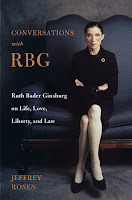Happy February! As I mentioned on Saturday, I know I've been little seen on social media as of late, but that suits my current needs. Still, I wanted to share what I've read and listened to since my last summary. If you follow me on Goodreads, then you've already seen my thoughts on these books. Thanks to the publishers, audiobook publishers, and/or Libro.fm for the review copies.
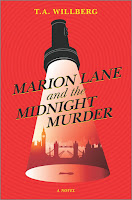 Marion Lane and the Midnight Murder by T. A. Willberg (Park Lane; Dec. 29): Fun mystery/fantasy set in a secret, underground investigation agency in 1950s London. Unsolved crimes, mysterious letters, leftover and unused technology from World War II, and a closed-room-type murder. Can Marion Lane solve the crime, keep her job, and save her innocent colleagues before it's too late? This was good escape reading, with a clever concept and unique gadgets, though the plotting could have been tighter. The audiobook was adequately read by Karen Cass. Her pace was little quick, but she was nicely expressive.
Marion Lane and the Midnight Murder by T. A. Willberg (Park Lane; Dec. 29): Fun mystery/fantasy set in a secret, underground investigation agency in 1950s London. Unsolved crimes, mysterious letters, leftover and unused technology from World War II, and a closed-room-type murder. Can Marion Lane solve the crime, keep her job, and save her innocent colleagues before it's too late? This was good escape reading, with a clever concept and unique gadgets, though the plotting could have been tighter. The audiobook was adequately read by Karen Cass. Her pace was little quick, but she was nicely expressive.
 Nick by Michael Farris Smith (Little, Brown; Jan 5): I enjoy books that reimagine classics or are set in the same universe as a well-known novel. In this case, Smith creates the backstory for Nick Carraway (of The Great Gatsby fame) from his Midwest childhood, through World War I, and back to the States, where he eventually ends up in Long Island in the cottage next to Jay Gatsby. The story itself, especially of the war in France and in the trenches, is well done. The section that takes place in New Orleans is perhaps less successful. What's more, I'm not quite sure the book informs or expands on Fitzgerald's original. The good news is that Robert Petkoff did an amazing job as narrator (see my thoughts at AudioFile Magazine).
Nick by Michael Farris Smith (Little, Brown; Jan 5): I enjoy books that reimagine classics or are set in the same universe as a well-known novel. In this case, Smith creates the backstory for Nick Carraway (of The Great Gatsby fame) from his Midwest childhood, through World War I, and back to the States, where he eventually ends up in Long Island in the cottage next to Jay Gatsby. The story itself, especially of the war in France and in the trenches, is well done. The section that takes place in New Orleans is perhaps less successful. What's more, I'm not quite sure the book informs or expands on Fitzgerald's original. The good news is that Robert Petkoff did an amazing job as narrator (see my thoughts at AudioFile Magazine).
 Grounds for Murder by Tara Lush (Crooked Lane, Dec. 8). This first in a new series is set on a small island off the coast of Florida. When Lana Lewis, an award winning newspaper reporter, needs a fresh start, she returns to her home town to take over the coffee shop opened by her late mother. When her best barista quits and then is found murdered near the cafe's back door, Lana finds herself on the short list of suspects. Lush sets up a fun a cozy mystery, complete with a cute dog, an even cuter police chief, a rival coffee shop, and variety of local characters. Lana, of course, can't help but get involved with hunting down clues and with getting to know Chief Noah. Recommended for coffee lovers and light mystery fans.
Grounds for Murder by Tara Lush (Crooked Lane, Dec. 8). This first in a new series is set on a small island off the coast of Florida. When Lana Lewis, an award winning newspaper reporter, needs a fresh start, she returns to her home town to take over the coffee shop opened by her late mother. When her best barista quits and then is found murdered near the cafe's back door, Lana finds herself on the short list of suspects. Lush sets up a fun a cozy mystery, complete with a cute dog, an even cuter police chief, a rival coffee shop, and variety of local characters. Lana, of course, can't help but get involved with hunting down clues and with getting to know Chief Noah. Recommended for coffee lovers and light mystery fans.
 People Like Her by Ellery Lloyd (Harper; Jan. 12). A contemporary thriller that focuses on a mommy blogger/Instagrammer who has hit it big. Emmy is a master at creating the illusion of being perfectly imperfect, so her millions of followers can believe she is just like them. Between sponsored content and photos that show her "messy" house or "unkempt" hair, Emmy gives off-the-cuff advice online and at live events. She and her husband, Dan (a one-trick novelist), live off her income and pride themselves on maintaining their privacy. What happens when that privacy is breached and personal photos begin to appear online and they acquire a stalker out to teach Emmy a lesson for perceived offenses? Though the plot was a bit draggy in places, the book does make you wonder about the safety of real-life mega influencers. The thriller part was creepy and there was at least one twist I didn't see coming. (For my thoughts on the audiobook, see AudioFile Magazine).
People Like Her by Ellery Lloyd (Harper; Jan. 12). A contemporary thriller that focuses on a mommy blogger/Instagrammer who has hit it big. Emmy is a master at creating the illusion of being perfectly imperfect, so her millions of followers can believe she is just like them. Between sponsored content and photos that show her "messy" house or "unkempt" hair, Emmy gives off-the-cuff advice online and at live events. She and her husband, Dan (a one-trick novelist), live off her income and pride themselves on maintaining their privacy. What happens when that privacy is breached and personal photos begin to appear online and they acquire a stalker out to teach Emmy a lesson for perceived offenses? Though the plot was a bit draggy in places, the book does make you wonder about the safety of real-life mega influencers. The thriller part was creepy and there was at least one twist I didn't see coming. (For my thoughts on the audiobook, see AudioFile Magazine).
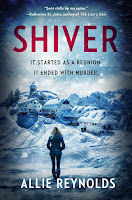 Shiver by Allie Reynolds (Putnam; Jan. 19). For her debut novel, Allie Reynolds draws on what she knows--competitive snowboarding--to set the scene for this closed-room-type thriller set in the French Alps. Ten years after a tragic competitive snowboarding season left one woman dead and other paralyzed, Milla receives an invitation to meet at the remote ski resort during the preseason to reunite with her ex-teammates. Right from the start, Reynolds paints the scene of cold, isolation, and danger, though the five friends are focused on each other more than their surroundings. Within hours, however, the group begins to suspect that there is more to this reunion than just finding closure, especially after their cell phones are stolen. Mysterious sights, sounds, and smells put them on edge, until they begin to fear for their lives. Who really invited them to the chalet and will any of them survive the weekend? The mystery is nicely set up, with a few good red herrings and revealed secrets. The story is told by Milla and alternates between then and now. I particularly liked the sections dealing with snowboarding. Good escape reading. (For my thoughts on the audiobook, see AudioFile Magazine).
Shiver by Allie Reynolds (Putnam; Jan. 19). For her debut novel, Allie Reynolds draws on what she knows--competitive snowboarding--to set the scene for this closed-room-type thriller set in the French Alps. Ten years after a tragic competitive snowboarding season left one woman dead and other paralyzed, Milla receives an invitation to meet at the remote ski resort during the preseason to reunite with her ex-teammates. Right from the start, Reynolds paints the scene of cold, isolation, and danger, though the five friends are focused on each other more than their surroundings. Within hours, however, the group begins to suspect that there is more to this reunion than just finding closure, especially after their cell phones are stolen. Mysterious sights, sounds, and smells put them on edge, until they begin to fear for their lives. Who really invited them to the chalet and will any of them survive the weekend? The mystery is nicely set up, with a few good red herrings and revealed secrets. The story is told by Milla and alternates between then and now. I particularly liked the sections dealing with snowboarding. Good escape reading. (For my thoughts on the audiobook, see AudioFile Magazine).
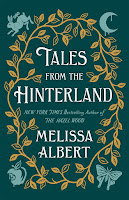 Tales from the Hinterland by Melissa Albert (Flatiron; Jan. 12). These dark tales are perfect for winter reading. Although the stories in this collection are set in the same universe as The Hazel Wood, you don't have to have read the novel to enjoy these creepy fairy-tale-like stories. I don't often read collections straight through, but I was totally caught up in these stories -- they have just right about of darkness. The stories with a moral (for example, be careful of what you wish for) don't hit you over the head with their lessons, and the illustrations (mostly black and red) are gorgeous.
Tales from the Hinterland by Melissa Albert (Flatiron; Jan. 12). These dark tales are perfect for winter reading. Although the stories in this collection are set in the same universe as The Hazel Wood, you don't have to have read the novel to enjoy these creepy fairy-tale-like stories. I don't often read collections straight through, but I was totally caught up in these stories -- they have just right about of darkness. The stories with a moral (for example, be careful of what you wish for) don't hit you over the head with their lessons, and the illustrations (mostly black and red) are gorgeous.
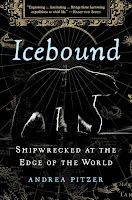 Icebound by Andrea Pitzer (Scribner; Jan. 12). I love these kinds of books! In this well-researched book we learn all about the expeditions led by William Barents, a Dutch explorer who attempted find a northern route to Asia in the late 1500s. He sailed farther north than any other Westerner at the time, fending off the fabled (for the crew) white bears, getting trapped in ice, and facing bitter cold. On the last trip, Barents and his team were forced to spend a winter with dwindling supplies in a hut, they built from wood "borrowed" from their ship. Staying warm, finding food, staving off scurvy, and keeping sane over the long sunless months was amazing in itself. In the spring, however, the men realized they had to abandon their iced-in ship and try to make it home in a couple of small boats. Fascinating details about mutiny, early thoughts on polar ecology, issues with nutrition, confrontations with polar bears, and more. As I often do with nonfiction, I both read and listened to this gripping real-life story. Fred Sanders did an excellent job with the narration, keeping my total attention. Note that my listening experience was much enhanced by being able to follow the voyages on the maps included with the print/digital book.
Icebound by Andrea Pitzer (Scribner; Jan. 12). I love these kinds of books! In this well-researched book we learn all about the expeditions led by William Barents, a Dutch explorer who attempted find a northern route to Asia in the late 1500s. He sailed farther north than any other Westerner at the time, fending off the fabled (for the crew) white bears, getting trapped in ice, and facing bitter cold. On the last trip, Barents and his team were forced to spend a winter with dwindling supplies in a hut, they built from wood "borrowed" from their ship. Staying warm, finding food, staving off scurvy, and keeping sane over the long sunless months was amazing in itself. In the spring, however, the men realized they had to abandon their iced-in ship and try to make it home in a couple of small boats. Fascinating details about mutiny, early thoughts on polar ecology, issues with nutrition, confrontations with polar bears, and more. As I often do with nonfiction, I both read and listened to this gripping real-life story. Fred Sanders did an excellent job with the narration, keeping my total attention. Note that my listening experience was much enhanced by being able to follow the voyages on the maps included with the print/digital book.
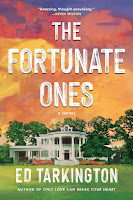 The Fortunate Ones by Ed Tarkington (Algonquin; Jan. 5). I really liked this coming-of-age story set mostly in Nashville about Charlie, a poor, fatherless boy living on the wrong side of town with his pretty mother and wannabe singer aunt. Charlie's prospects change when his mother gets a job being the "helper" of a rich woman. The job comes with definite perks: Charlie and his mother now live in the pool house of the wealthy family and Charlie attends a prestigious private school on scholarship. Charlie also befriends Vanessa and Jamie, the twins who live in the big house. Charlie's most significant new relationship, though, is with Archer, a fellow student who is tapped to guide Charlie through the intricacies of school life. Archer ends up teaching Charlie much more than the school fight song, helping him learn to live among the rich and privileged. This is an engrossing read that examines boyhood friendship, first love, the choice between following what's expected and following one's own dreams, truths and secrets, rich and poor, white and black. Excellent story and highly recommended. (For my thoughts on the audiobook, see AudioFile Magazine).
The Fortunate Ones by Ed Tarkington (Algonquin; Jan. 5). I really liked this coming-of-age story set mostly in Nashville about Charlie, a poor, fatherless boy living on the wrong side of town with his pretty mother and wannabe singer aunt. Charlie's prospects change when his mother gets a job being the "helper" of a rich woman. The job comes with definite perks: Charlie and his mother now live in the pool house of the wealthy family and Charlie attends a prestigious private school on scholarship. Charlie also befriends Vanessa and Jamie, the twins who live in the big house. Charlie's most significant new relationship, though, is with Archer, a fellow student who is tapped to guide Charlie through the intricacies of school life. Archer ends up teaching Charlie much more than the school fight song, helping him learn to live among the rich and privileged. This is an engrossing read that examines boyhood friendship, first love, the choice between following what's expected and following one's own dreams, truths and secrets, rich and poor, white and black. Excellent story and highly recommended. (For my thoughts on the audiobook, see AudioFile Magazine).
 The Age of Wood by Roland Ennos (Scribner; Dec. 1). I really enjoyed this fascinating retelling of human evolution that puts trees and wood at the hub of our physical and cultural and technological changes over the last 3 million years or so. As a student of human evolution (I have a PhD), I was interested in Ennos's tweaking of the focus from fire, stone, iron, and bronze through to silicone to our dependence on wood throughout our history, even unto today. His well-though-out arguments include everything from politics (the role of trees in starting the US Revolutionary War) to biology (the development of typical primate traits, such as nails instead of claws) to migration and travel (boats, wheels) and to shelter (even today's houses are still framed in wood or wood products). If you're a student of human evolution, this book will give you much to think about. But in any case, it will make you appreciate the trees and wood products that are part of your everyday life. As is often the case with nonfiction, I both read and listened to this book. (For my thoughts on the audiobook, see AudioFile Magazine).
The Age of Wood by Roland Ennos (Scribner; Dec. 1). I really enjoyed this fascinating retelling of human evolution that puts trees and wood at the hub of our physical and cultural and technological changes over the last 3 million years or so. As a student of human evolution (I have a PhD), I was interested in Ennos's tweaking of the focus from fire, stone, iron, and bronze through to silicone to our dependence on wood throughout our history, even unto today. His well-though-out arguments include everything from politics (the role of trees in starting the US Revolutionary War) to biology (the development of typical primate traits, such as nails instead of claws) to migration and travel (boats, wheels) and to shelter (even today's houses are still framed in wood or wood products). If you're a student of human evolution, this book will give you much to think about. But in any case, it will make you appreciate the trees and wood products that are part of your everyday life. As is often the case with nonfiction, I both read and listened to this book. (For my thoughts on the audiobook, see AudioFile Magazine).
 The Heiress by Molly Greeley (William Morrow; Jan. 5). I generally like books that retell classics or reimagine a fuller life for minor characters. In this book, Molly Greeley turns the spotlight on Anne de Bourgh, the daughter of Lady de Bourgh and the "promised from birth" bride to Mr. Darcy, introduced in Austen's Pride & Prejudice. While the general concept of the novel was good and it was fun to get glimpses of Anne's male cousins and Elizabeth Bennett through her eyes, the novel didn't work for me on a number of levels. Note that the next few sentences hint at some minor spoilers. Here are my negative thoughts in short form: There was not a strong enough driving force to keep me invested in Anne's ultimate fate, which was foreshadowed fairly early on. I would have liked to have seen more direct confrontations between Anne and her mother. Anne's "cure" from her lifelong affliction was in and of itself believable, but the fact that she was so easily able to move on from it did not seem so believable. I questioned some of Anne's choices, especially since she made a major one without consulting her solicitor. Though she reconnected with the Darcys, I think there was a missed opportunity for Anne to have a relationship with Lizzy, especially given Anne's newfound thoughts about feminism. Finally, the ending was a little hokey for me, though it did serve as a means to let us know what happened to various characters. The audiobook was very well read by Ell Potter, whose expressive performance highlighted Anne's transformation and picked up on the various characters' personalities.
The Heiress by Molly Greeley (William Morrow; Jan. 5). I generally like books that retell classics or reimagine a fuller life for minor characters. In this book, Molly Greeley turns the spotlight on Anne de Bourgh, the daughter of Lady de Bourgh and the "promised from birth" bride to Mr. Darcy, introduced in Austen's Pride & Prejudice. While the general concept of the novel was good and it was fun to get glimpses of Anne's male cousins and Elizabeth Bennett through her eyes, the novel didn't work for me on a number of levels. Note that the next few sentences hint at some minor spoilers. Here are my negative thoughts in short form: There was not a strong enough driving force to keep me invested in Anne's ultimate fate, which was foreshadowed fairly early on. I would have liked to have seen more direct confrontations between Anne and her mother. Anne's "cure" from her lifelong affliction was in and of itself believable, but the fact that she was so easily able to move on from it did not seem so believable. I questioned some of Anne's choices, especially since she made a major one without consulting her solicitor. Though she reconnected with the Darcys, I think there was a missed opportunity for Anne to have a relationship with Lizzy, especially given Anne's newfound thoughts about feminism. Finally, the ending was a little hokey for me, though it did serve as a means to let us know what happened to various characters. The audiobook was very well read by Ell Potter, whose expressive performance highlighted Anne's transformation and picked up on the various characters' personalities.
 The Narrowboat Summer by Anne Youngson (Flatiron; Jan. 26). What a charming and fun story. When Eve and Sally cross paths along the canal and, though strangers, decide to rescue a howling dog who's locked in a narrowboat, they had no idea their lives were about to change forever. After meeting the boat's (and the dog's) owner, the two women, for a number of reasons, agree to take the boat through the canals of England to get it serviced. Meanwhile the owner must undergo some medical treatment. The slow trip through England, the people the women meet, their growing confidence with controlling the boat and going through the locks, and their own personal growth won me over. It made me wish for just such a summer.
The Narrowboat Summer by Anne Youngson (Flatiron; Jan. 26). What a charming and fun story. When Eve and Sally cross paths along the canal and, though strangers, decide to rescue a howling dog who's locked in a narrowboat, they had no idea their lives were about to change forever. After meeting the boat's (and the dog's) owner, the two women, for a number of reasons, agree to take the boat through the canals of England to get it serviced. Meanwhile the owner must undergo some medical treatment. The slow trip through England, the people the women meet, their growing confidence with controlling the boat and going through the locks, and their own personal growth won me over. It made me wish for just such a summer.
 The Divines by Ellie Eaton (William Morrow; Jan. 19) This dual-time period coming-of-age story worked on some levels and didn't on others. In the 1990s Jo was a student at an elite private girl's school in England, where she was sometimes one of the cool girls and sometimes not. Even among friends, all the girls experienced at least some level of bullying, but for those who were at all different, bullying was the norm and done out in the open. On her honeymoon decades later, Jo impulsively visits the now-defunct school's campus, and from there, unresolved issues, relationships, regrets, and memories bubble up, haunting her and her marriage for years. Much of this story had a feeling of truth. Girls can be so mean to each other. But do school authorities, even those who work in a private school for the very rich, really allow this much blatant meanness and disregard for their teachers and the rules? What do I know as an American who went to (albeit a small one) public school in more innocent time? Jo's relationship with her husband was also equally believable and not. He seemed a little too perfect, and she seemed to have hidden way more than she needed to. I get why she didn't want to confess all her childhood sins, but she seemed to share very little with him of what happened that final year at the school and the tragedy that occurred. I'm not sorry I listened to this, especially because Imogen Church did such a great job with the narration -- getting the accents, the voices, the attitudes just right.
The Divines by Ellie Eaton (William Morrow; Jan. 19) This dual-time period coming-of-age story worked on some levels and didn't on others. In the 1990s Jo was a student at an elite private girl's school in England, where she was sometimes one of the cool girls and sometimes not. Even among friends, all the girls experienced at least some level of bullying, but for those who were at all different, bullying was the norm and done out in the open. On her honeymoon decades later, Jo impulsively visits the now-defunct school's campus, and from there, unresolved issues, relationships, regrets, and memories bubble up, haunting her and her marriage for years. Much of this story had a feeling of truth. Girls can be so mean to each other. But do school authorities, even those who work in a private school for the very rich, really allow this much blatant meanness and disregard for their teachers and the rules? What do I know as an American who went to (albeit a small one) public school in more innocent time? Jo's relationship with her husband was also equally believable and not. He seemed a little too perfect, and she seemed to have hidden way more than she needed to. I get why she didn't want to confess all her childhood sins, but she seemed to share very little with him of what happened that final year at the school and the tragedy that occurred. I'm not sorry I listened to this, especially because Imogen Church did such a great job with the narration -- getting the accents, the voices, the attitudes just right.
Click for more
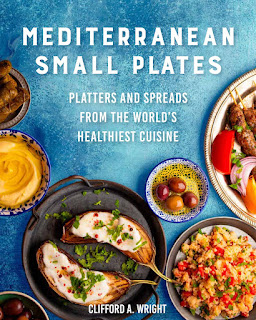 Mediterranean Small Plates by Clifford A. Wright (Harvard Common Press, August): Who doesn't love having substantial appetizers for dinner? In this cookbook, Wright takes us all the way around the Mediterranean Sea in small plates: from tapas in Spain to hors d'oeuvres in France; meze in Greece, Turkey, and the Balkans; and ending with mazza in the Mideast and North Africa. The opening chapters introduce us to the health benefits of the Mediterranean diet, how to make a balanced small-plate meal, and a list of ingredients to have on hand. The chapters explore each region separately, providing recipes, background info, tips, wine pairings, and more. The cookbook ends with almost 20 menus for small-plate meals for entertaining. Pretty much everyone will find more than a few recipes that will fit their dietary plan; I was impressed with the variety of flavors and types of dishes. Note too that many of the recipes are easy and quick enough for weeknight dinners.
Mediterranean Small Plates by Clifford A. Wright (Harvard Common Press, August): Who doesn't love having substantial appetizers for dinner? In this cookbook, Wright takes us all the way around the Mediterranean Sea in small plates: from tapas in Spain to hors d'oeuvres in France; meze in Greece, Turkey, and the Balkans; and ending with mazza in the Mideast and North Africa. The opening chapters introduce us to the health benefits of the Mediterranean diet, how to make a balanced small-plate meal, and a list of ingredients to have on hand. The chapters explore each region separately, providing recipes, background info, tips, wine pairings, and more. The cookbook ends with almost 20 menus for small-plate meals for entertaining. Pretty much everyone will find more than a few recipes that will fit their dietary plan; I was impressed with the variety of flavors and types of dishes. Note too that many of the recipes are easy and quick enough for weeknight dinners. Ultimate Food Atlas from National Geographic Kids (Hachette, June): I cannot wait to delve into this fun, colorful, and informative atlas. Each chapter focuses on a continent (the Australia chapter includes Oceania) plus there's a chapter dealing with climate change and the world food supply. Each chapter discusses a variety of topics pertaining to the continent (such as food production, festivals, and global issues) and includes descriptions and photos of regional foods. Instead of going country by country, the maps and sections home in on areas that share climatic, geographical, or ecological traits. Fun facts, recipes, activities, games, quizzes, and super graphics make the book a delight to look through and easy to read.
Ultimate Food Atlas from National Geographic Kids (Hachette, June): I cannot wait to delve into this fun, colorful, and informative atlas. Each chapter focuses on a continent (the Australia chapter includes Oceania) plus there's a chapter dealing with climate change and the world food supply. Each chapter discusses a variety of topics pertaining to the continent (such as food production, festivals, and global issues) and includes descriptions and photos of regional foods. Instead of going country by country, the maps and sections home in on areas that share climatic, geographical, or ecological traits. Fun facts, recipes, activities, games, quizzes, and super graphics make the book a delight to look through and easy to read. Bake by Paul Hollywood (Bloomsbury, July): In this cookbook, the world's favorite expert on all things baking shares his recipes for classic bakes: cakes, cookies, breads, pastries, and other desserts. I love to bake and am looking forward to the fall when I can try some of Hollywood's versions of naan bread, shortbread, brownie cheesecake, orange brioche, sausage rolls, bread pudding ... and well, just about everything! Beautiful photographs (some showing a step-by-step process) inspire me to don my apron, get out my pastry board, and start baking. While waiting for cooler temperatures, I plan to read through the cookbook and learn Hollywood's techniques and tweaks and tips for achieving my best bakes yet.
Bake by Paul Hollywood (Bloomsbury, July): In this cookbook, the world's favorite expert on all things baking shares his recipes for classic bakes: cakes, cookies, breads, pastries, and other desserts. I love to bake and am looking forward to the fall when I can try some of Hollywood's versions of naan bread, shortbread, brownie cheesecake, orange brioche, sausage rolls, bread pudding ... and well, just about everything! Beautiful photographs (some showing a step-by-step process) inspire me to don my apron, get out my pastry board, and start baking. While waiting for cooler temperatures, I plan to read through the cookbook and learn Hollywood's techniques and tweaks and tips for achieving my best bakes yet. To Fall in Love, Drink This by Alice Feiring (Scribner, August): If you don't know, Feiring is a James Beard award winner for her wine journalism. Besides books and articles, she also writes The Feiring Line newsletter about natural wine (see her website for more). The essays and short pieces in this volume work together as a memoir. Among the stories Feiring shares are ones about her observant Jewish family and childhood, about how she discovered the world of wine, about winemakers and the industry, and about the men in her life. Her focus is on wines that are free from the many additives used in most mainstream wines. She also introduces us to various wine regions around the world and suggests wines to put on your to-buy lists. I plan to savor this collection, one essay at a time.
To Fall in Love, Drink This by Alice Feiring (Scribner, August): If you don't know, Feiring is a James Beard award winner for her wine journalism. Besides books and articles, she also writes The Feiring Line newsletter about natural wine (see her website for more). The essays and short pieces in this volume work together as a memoir. Among the stories Feiring shares are ones about her observant Jewish family and childhood, about how she discovered the world of wine, about winemakers and the industry, and about the men in her life. Her focus is on wines that are free from the many additives used in most mainstream wines. She also introduces us to various wine regions around the world and suggests wines to put on your to-buy lists. I plan to savor this collection, one essay at a time. A Dish for All Seasons by Kathryn Pauline (Chronicle, August): I'm intrigued with the concept of this cookbook. Instead of dividing her recipes into four chapters (winter, spring, summer, fall), Pauline features a single dish and offers variations and transformations to fit the season. The main chapters are by meal or type of dish (breakfast, salads, sides); those chapters are organized by specific dishes. I'll illustrate the idea by focusing on one dish. Under "Mains" we find a section called "Sandwiches." Pauline describes her idea of a deli sandwich and then provides a grid for mixing and matching seasonal produce and flavors. Then she gives her best tips on how to create the "perfect" sandwich. Next she offers four recipes, one for each season. In this case, we find Shrimp Rolls, Boiled Corn, and Potatoes for summer, Falafel with Lemon Tahini Sauce and Lacto-Fermented Torshi for fall, a Meatball Sub with Caramelized Fennel for winter, and Bánh Mi for spring. Despite the examples I gave here, vegans, gluten-free eaters, and vegetarians will find plenty of recipes and seasonal combos to fit their needs. I'll likely use this cookbook before fall because I'd love to try some summer recipes while the farmer's markets are still in full swing.
A Dish for All Seasons by Kathryn Pauline (Chronicle, August): I'm intrigued with the concept of this cookbook. Instead of dividing her recipes into four chapters (winter, spring, summer, fall), Pauline features a single dish and offers variations and transformations to fit the season. The main chapters are by meal or type of dish (breakfast, salads, sides); those chapters are organized by specific dishes. I'll illustrate the idea by focusing on one dish. Under "Mains" we find a section called "Sandwiches." Pauline describes her idea of a deli sandwich and then provides a grid for mixing and matching seasonal produce and flavors. Then she gives her best tips on how to create the "perfect" sandwich. Next she offers four recipes, one for each season. In this case, we find Shrimp Rolls, Boiled Corn, and Potatoes for summer, Falafel with Lemon Tahini Sauce and Lacto-Fermented Torshi for fall, a Meatball Sub with Caramelized Fennel for winter, and Bánh Mi for spring. Despite the examples I gave here, vegans, gluten-free eaters, and vegetarians will find plenty of recipes and seasonal combos to fit their needs. I'll likely use this cookbook before fall because I'd love to try some summer recipes while the farmer's markets are still in full swing. Eat Up! by Ruby Tandoh (Vintage, July): If the name Ruby Tandoh sounds familiar to you, it may be because she was a finalist in the Great British Bake Off or because you've read some of her articles focusing on the intersection of food and society and culture at large. In this collection of essays, Tandoh focuses on issues that are near and dear to her, especially how attitudes about what we eat, what we look like, and who we are entangled and difficult to unknot. She talks about body shaming, being gay, emotional eating, and food in movies. She isn't shy to praise or condemn the foodie elite and food snobs. As I often do with essay collections, I plan to read this one piece at a time, all the while, taking Tandoh's advice to enjoy what I'm eating and ignore the naysayers. Note that she has a cookbook coming out in November.
Eat Up! by Ruby Tandoh (Vintage, July): If the name Ruby Tandoh sounds familiar to you, it may be because she was a finalist in the Great British Bake Off or because you've read some of her articles focusing on the intersection of food and society and culture at large. In this collection of essays, Tandoh focuses on issues that are near and dear to her, especially how attitudes about what we eat, what we look like, and who we are entangled and difficult to unknot. She talks about body shaming, being gay, emotional eating, and food in movies. She isn't shy to praise or condemn the foodie elite and food snobs. As I often do with essay collections, I plan to read this one piece at a time, all the while, taking Tandoh's advice to enjoy what I'm eating and ignore the naysayers. Note that she has a cookbook coming out in November.







































